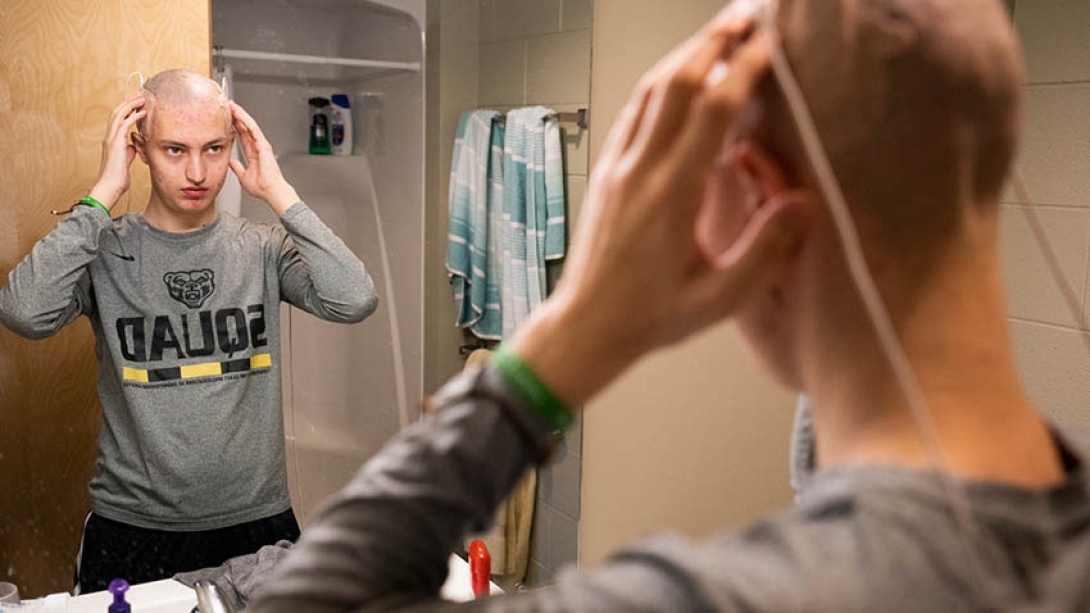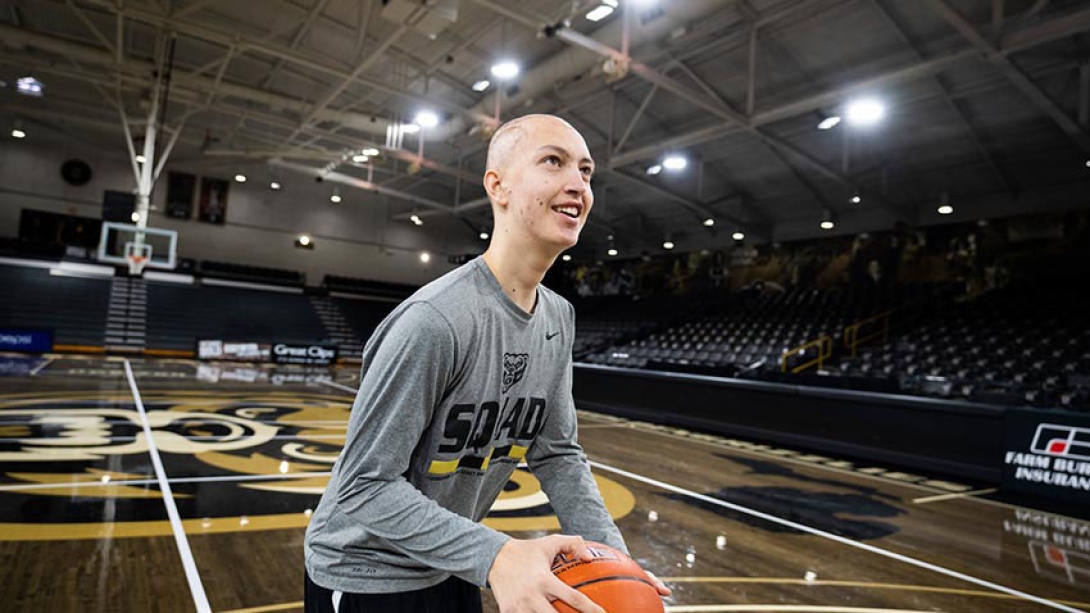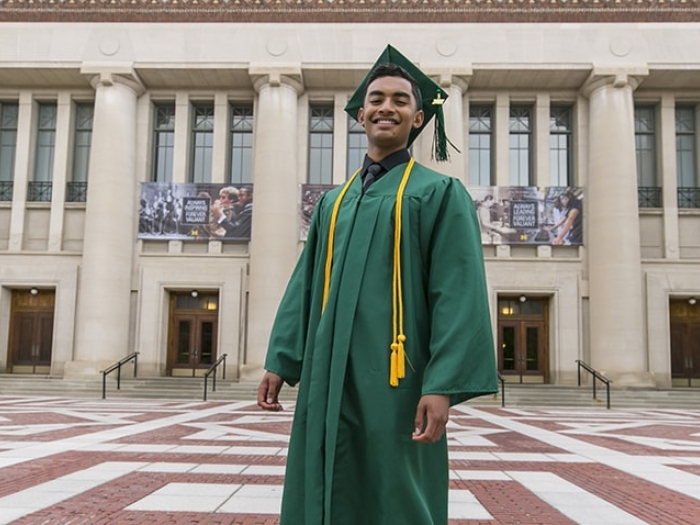Sam was diagnosed with glioblastoma his freshman year of high school. After three years of unconventional therapies, he’s enjoying life as a college freshman.
5:00 AM
Author |
During his high school commencement speech last spring, Sam Kell told classmates why that milestone was especially meaningful for his family.
Many thought "I'd have no chance of being here tonight," he said.
Just a few months into his freshman year while running with the cross country team, Sam experienced double vision that prompted an MRI.
The result: brain cancer.
The next day, the then 14-year-old underwent brain surgery to remove as much of the tumor as possible. But the diagnosis remained grim: Grade IV glioblastoma is an aggressive, fast-growing brain cancer with an average life expectancy of 12-18 months.
That was in November, 2015.
Today, the 18-year-old is a freshman at Oakland University in Rochester near his family's home where he's a manager for the men's basketball team.
"I'm filled with gratitude," he says.
A nonconventional approach
For the last three and half years, Sam has been on two experimental treatments overseen by Michigan Medicine C.S. Mott Children's Hospital at the University of Michigan.
"Sam's outcome is not typical," says Carl Koschmann, M.D., Mott pediatric oncologist and researcher with the Chad Carr Pediatric Brain Tumor Center at Michigan Medicine.
"We have no experience with young adults on the treatment Sam is on. We don't have enough data to know if either or both of these therapies contributed to his success, but he's doing well with both of them and seems to be up for the fight, so we've continued them to this day."
Sam underwent DNA and RNA genomic sequencing at Mott to confirm which mutation was driving his cancer and help match him with an unconventional treatment to target that specific mutation. The sequencing results convinced doctors to treat the teen with a drug called everolimus – typically used to prevent rejection of organ transplants and in the treatment of renal cell cancer, not brain tumors.
In addition to the medication, Sam also opted to use a wearable device called Optune, which uses adhesive patches on the head that create low intensity, wave like electric fields with the goal to stop or slow glioblastoma tumor cells from dividing.
Cancer is part of my story, but I learned that cancer is not who I am. Even our worst enemies deserve our gratitude because they teach us so much.Sam Kell
The therapy, predominately used by adult patients, requires that Sam shave his head every morning and hook the device on for nearly 18 hours. He maintained the intense daily routine for the last three years of high school and continues to do so at college.
Sam's prognosis was helped by having a majority of his tumor removed by his initial surgery – leaving fewer cancer cells to grow back, Koschmann says. Still, even with a good resection, only a small minority of patients with glioblastoma survive two years.
His case was so unique that researchers detailed it in a case report published in the British Medical Journal last year.
Koschmann says care teams were impressed by Sam's commitment to staying compliant with the therapies, all while keeping up with classes and playing on the basketball team at Stoney Creek High School in Rochester.
"We wouldn't typically ask a teen to keep up with a therapy that requires shaving your head every day and using a device for 18 hours while attending high school," Koschmann says. "But he was up for the logistics and never missed a day. We were astonished at how well he kept up with it."
Sam's mom, Gina Kell Spehn, says when the family researched glioblastoma and learned about expected outcomes, they knew they wanted to try something different. They were also wary of how chemotherapy might impact his quality of life.
"The results for what had been the standard of care for decades weren't promising," she says. "We wanted to explore all of the possibilities."
"Sequencing Sam's tumor helped doctors examine it from a different perspective and explore an out-of-the-box approach. For us so far, saying yes to something completely unconventional was the right choice."

A community's support
Sam's cancer diagnosis was a trying time for his family members who were all too familiar with the disease.
Sam's biological father, Matt Kell, died of a rare form of cancer on Christmas Day in 2005 when Sam was just four years old. And his stepdad, Michael Spehn's first wife, Cathy, died of glioblastoma in 2006.
MORE FROM MICHIGAN: Sign up for our weekly newsletter
The grief of losing their spouses just weeks apart brought Kell Spehn and Spehn together, marrying in 2007 and merging their family of five children. The couple shared their story in their book "The Color of Rain," which was turned into a Hallmark movie.
The family's nonprofit, New Day Foundation for Families, has also helped hundreds of people dealing with cancer – an effort started long before Sam's diagnosis.
"It was devastating to everyone. I had a moment where I just fell apart," Kell Spehn remembers of the day Sam was diagnosed. "Given our family history, and what we had already been through with Sam's dad, I could only think of the worst at that moment. It was a really hard blow."
But she said she and husband Michael were blown away by all the support – and especially Sam's positive attitude.
"It's been amazing to see how this community came together and rallied around this kid. We are so grateful for all of the love, support and prayers," Kell Spehn says.
"Throughout this experience there has been a completely new Sam," she adds. "He's leaned on his faith and been optimistic and joyful. I don't think he's ever had a day when he said 'I'm giving up.' We are so proud of how he's handled everything. Today's he's thriving, and the world is his oyster."

Focused on the future
For high risk brain tumors, which have surgical limitations because of their location, and that are resistant to the best known therapies, there is no established standard of care proven to help the prognosis. For these pediatric cancer patients, doctors need to consider treatment that may not have ever been tried before, Koschmann says.
LISTEN UP: Add the Michigan Medicine News Break to your Alexa-enabled device, or subscribe to our daily updates on iTunes, Google Play and Stitcher.
And stories like Sam's are strong motivators for pushing the envelope with precision medicine. Mott was among the first hospitals in the country to use real time sequencing in the care of high risk pediatric tumors – and all high risk pediatric brain tumors are now routinely sequenced through the Mi-ONCOSEQ program at Michigan Medicine.
"We're in a relatively newer era where instead of treating all patients with cancer the same way, we are looking at the actual fingerprint of their tumor, sequencing it to find all the genes that mutated in that tumor and providing a treatment tailored to that specific patient," he says.
"When we have patients like Sam it's a huge boost for our medical team to continue outside-the-box ideas in these high-risk situations. We need to keep working to advance research and make precision medicine better for patients like him."
But because Sam's treatment is so unconventional, there's no precedent and little data to guide next steps. It will be up to him to decide how long he wants to stay on medication and the Optune routine.
It will be a "tough decision" to make down the road, Sam says.
For now, he says he's enjoying college life at Oakland. He's not sure what the future holds but, as a longtime sports fan and athlete, has an interest in coaching.
His strong faith and the support of family, doctors and his community are his anchors, he says.
"After I was diagnosed, my perspective on life changed," he says. "In some ways it's been a blessing to me because of all the things I've learned about life and focusing on the person I want to be and what's next."
"There are some things that might not make sense or be really hard but my life is centered around God and family. Bad things happen. Everybody knows that. It's just a matter of how we react to them. I'm just trying to enjoy life as much as possible and focus on the things that are in my control."
He's also following the advice of his late father who left him and his brother Drew letters and video diaries telling them to expect that "life won't be perfect or go as planned."
"Cancer is part of my story, but I learned that cancer is not who I am," he told his graduating class last spring. "Even our worst enemies deserve our gratitude because they teach us so much."

Explore a variety of health care news & stories by visiting the Health Lab home page for more articles.

Department of Communication at Michigan Medicine
Want top health & research news weekly? Sign up for Health Lab’s newsletters today!





